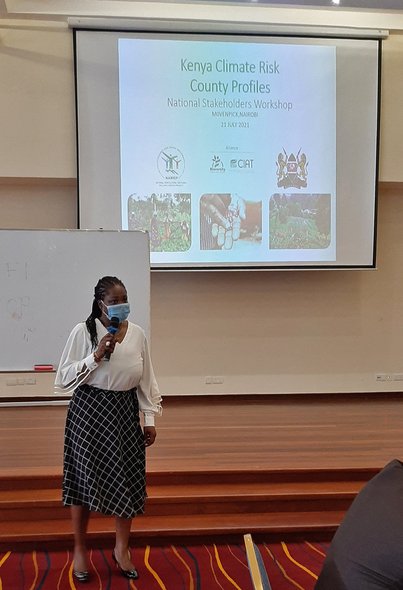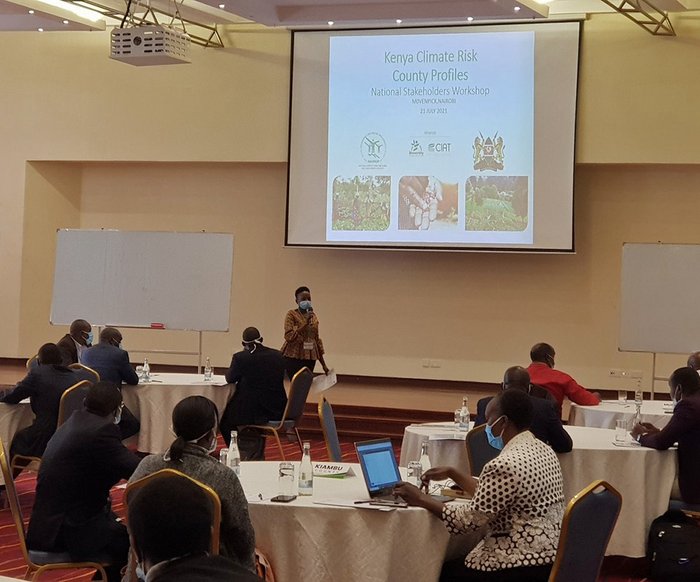Stakeholder workshop for the development of Kenya County Climate Risk Profiles

The Kenyan Ministry of Agriculture, Livestock and Fisheries partners with the Alliance of Bioversity International and CIAT to implement the World Bank’s National Agricultural and Rural Inclusive Growth Project.
Nairobi, Kenya, 21 July 2020 –The Alliance of Bioversity International and the International Center for Tropical Agriculture (CIAT) today held a stakeholder workshop for National and County government experts to deliberate and work on the development of Climate Change Risk Profiles for 14 Kenyan counties. Among the pool of stakeholders were officials from the Ministry of Agriculture, Livestock and Fisheries; Ministry of Environment and Forestry; Kenya Agricultural and Livestock Research Organization (KALRO); Climate Smart Agriculture Youth Network (CSAYN); County Executive Committee for Agriculture, Livestock, Fisheries and Cooperatives Development; National Agricultural and Rural Inclusive Growth Project (NARIGP) County Project Coordinators; and the County Environment Committees. The event was hosted by Suzanne Ngo-Eyok, the Alliance’s Managing Director for Africa, on behalf of the Ministry of Agriculture, Livestock and Fisheries.

County Climate Change Risk Profiles are crucial to informing County Governments and stakeholders on the risks and opportunities posed by climate change to enable them to better integrate these issues in their development plans and processes. With most counties in Kenya extensively working to contribute to resilient food systems, the profiles will serve as a basis to climate proof other agricultural projects in the counties of Bungoma, Kiambu, Kirinyaga, Kisii, Kitui, Migori, Murang’a, Nandi, Narok, Nyamira, Samburu, Turkana, Trans Nzoia and Vihiga.
“The efficient delivery of such profiles calls for wide stakeholder engagement at both national and county levels. As an organization that strongly believes in the power of partnerships to bring change, we have taken it upon ourselves to engage diverse stakeholders who are willing to lend their expertise to this exercise,” Suzanne Ngo-Eyok said.
“To ensure excellent results for each county, we have split the workshops into two. Today we are here in Nairobi to work with Kiambu, Kirinyaga, Kitui, Murang’a, Narok, Samburu and Turkana counties. On 23 July 2020, we shall be in Kisumu, working with Bungoma, Kisii, Migori, Nandi, Nyamira, Trans Nzoia and Vihiga counties,” she added.

The stakeholders will work together to extensively analyze the methodology being proposed, explore sources of relevant data and establish possible collaborations to develop a research-based Climate Risk Profile for each county. Following this national workshop, a second stakeholder workshop will be conducted during the next two months at each county with about twenty-five actors representing key agricultural value chains.
The workshops remain a crucial activity for the Ministry of Agriculture, Livestock and Fisheries in supporting the development of Climate Change Risk Profiles to guide planning and implementation of the World Bank's National Agricultural and Rural Inclusive Growth Project (NARIGP).
According to Mr. John Kimani, NARIGP National Project Coordinator, the study will be used as a basis to climate proof any other projects or developments in the fourteen counties.
In the fight against climate change, climate risk profiles remain a reliable source of information on current climate and possible future climate scenarios. When linked to natural resource and socio-economic information, this data will help to identify climate change-related vulnerabilities and risks for the population, livelihoods, investments and the environment, as well as potential positive impacts. The study shall focus on profiles of risks related to agriculture, land and other natural resources.
For further information, please contact:
Caroline Mwongera, PhD
Theme Leader, Policies and Institutions for Climate Action
